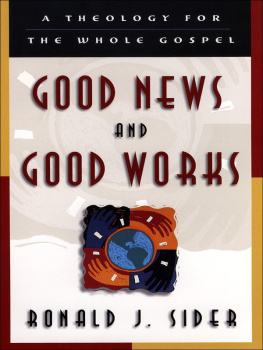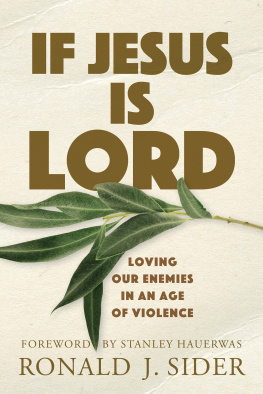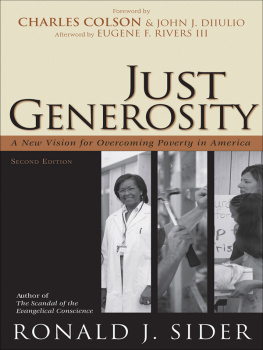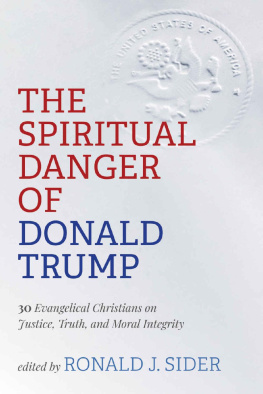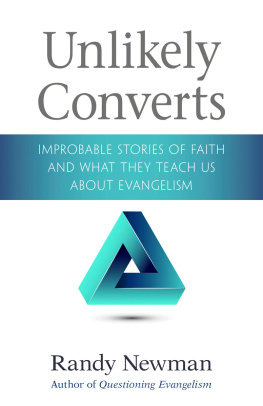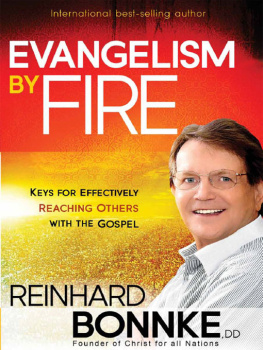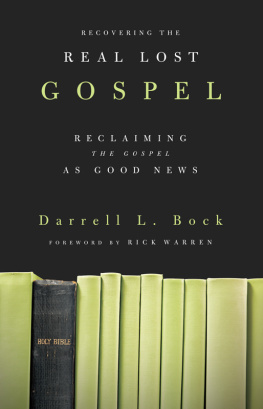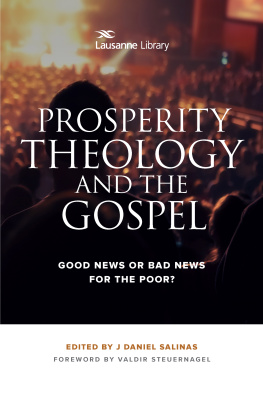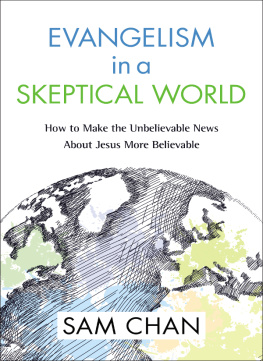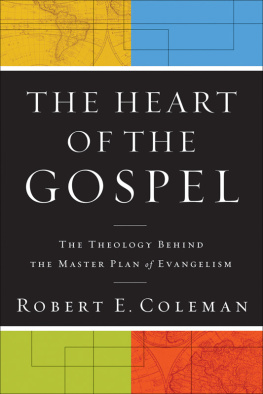Ronald J. Sider - Good News and Good Works: A Theology for the Whole Gospel
Here you can read online Ronald J. Sider - Good News and Good Works: A Theology for the Whole Gospel full text of the book (entire story) in english for free. Download pdf and epub, get meaning, cover and reviews about this ebook. year: 1999, publisher: Baker Publishing Group, genre: Religion. Description of the work, (preface) as well as reviews are available. Best literature library LitArk.com created for fans of good reading and offers a wide selection of genres:
Romance novel
Science fiction
Adventure
Detective
Science
History
Home and family
Prose
Art
Politics
Computer
Non-fiction
Religion
Business
Children
Humor
Choose a favorite category and find really read worthwhile books. Enjoy immersion in the world of imagination, feel the emotions of the characters or learn something new for yourself, make an fascinating discovery.
- Book:Good News and Good Works: A Theology for the Whole Gospel
- Author:
- Publisher:Baker Publishing Group
- Genre:
- Year:1999
- Rating:5 / 5
- Favourites:Add to favourites
- Your mark:
- 100
- 1
- 2
- 3
- 4
- 5
Good News and Good Works: A Theology for the Whole Gospel: summary, description and annotation
We offer to read an annotation, description, summary or preface (depends on what the author of the book "Good News and Good Works: A Theology for the Whole Gospel" wrote himself). If you haven't found the necessary information about the book — write in the comments, we will try to find it.
Good News and Good Works: A Theology for the Whole Gospel — read online for free the complete book (whole text) full work
Below is the text of the book, divided by pages. System saving the place of the last page read, allows you to conveniently read the book "Good News and Good Works: A Theology for the Whole Gospel" online for free, without having to search again every time where you left off. Put a bookmark, and you can go to the page where you finished reading at any time.
Font size:
Interval:
Bookmark:
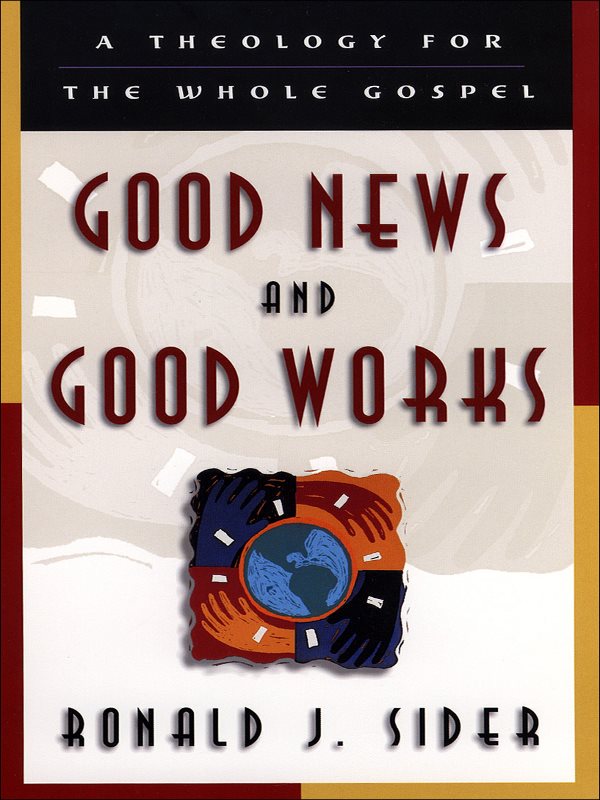
GOOD NEWS
AND
GOOD WORKS
Also by Ronald J. Sider
Cup of Water, Bread of Life
Rich Christians in an Age of Hunger
Christ and Violence
Living like Jesus
Completely Pro-Life
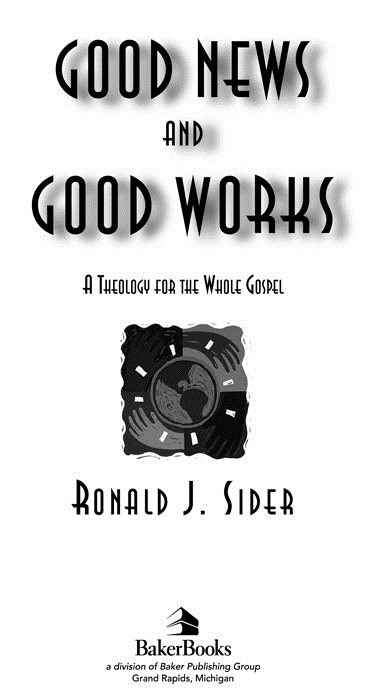
1993 by Ronald J. Sider
Published by Baker Books
a division of Baker Publishing Group
P.O. Box 6287, Grand Rapids, MI 49516-6287
www.bakerbooks.com
Previously published by Zondervan Publishing House under the title One-Sided Christianity? Uniting the Church to Heal a Lost and Broken World
E-book edition created 2011
All rights reserved. No part of this publication may be reproduced, stored in a retrieval system, or transmitted in any form or by any meansfor example, electronic, photocopy, recordingwithout the prior written permission of the publisher. The only exception is brief quotations in printed reviews.
ISBN 978-1-5855-8367-6
Library of Congress Cataloging-in-Publication Data is on file at the Library of Congress, Washington, D.C.
Unless otherwise indicated, Scripture quotations are from the Holy Bible, New International Version. NIV. Copyright 1973, 1978, 1984 by Biblica, Inc. Used by permission of Zondervan. All rights reserved worldwide. www.zondervan.com
Scripture quotations identified NRSV are from the New Revised Standard Version of the Bible, copyright 1989 by the Division of Christian Education of the National Council of the Churches of Christ in the USA. Used by permission.
Scripture quotations identified RSV are from the Revised Standard Version of the Bible, copyright 1946, 1952, 1971 by the Division of Christian Education of the National Council of the Churches of Christ in the USA. Used by permission.
To
John Stott
Colleen Samuel
Vinay Samuel
CONTENTS
O ver eighty years ago, Walter Rauschenbusch delivered his famous lectures at Yale called A Theology for the Social Gospel. This exposition of the social gospel by the movements most prominent spokesperson stands as the classic articulation of one side in the great social gospelfundamentalism debate that divided the church for much of the twentieth century.
In significant ways, Rauschenbuschs famous book (based on the lectures) offered much needed correctives. He rightly insisted that the church too often has understood both sin and salvation in onesided individualistic ways, neglected social justice, and ignored Jesus ethical teaching. But the weaknesses in Rauschenbuschs bookand the reasons theologically conservative Christians needed to challenge this articulation of the social gospelare equally clear.
Rauschenbusch bluntly insists that the social gospel plainly concentrates religious interest on the great ethical problems of social life. [] He belittles trust in the vicarious atonement of Christ as rigid dogma (101) and insists that the social gospel has little interest in metaphysical questions about the Trinity or deity of Christ (15051), not to mention Satan. For the social gospel, its chief interest is concentrated on those manifestations of sin and redemption which lie beyond the individual soul (95). Whereas the nonethical practices and beliefs in historical Christianity nearly all center on the winning of heaven and immortality, Rauschenbusch gladly predicts that the more the Social Gospel engages and inspires theological thought, the more will religion be concentrated on ethical righteousness (15).
This kind of tragically one-sided focus on the ethical aspects of Christian faith significantly contributed to one of the greatest divisions in twentieth-century Christianity. To transcend that division, we need a full-blown biblical theology that affirms both personal and social sin, both personal conversion and structural change, both evangelism and social action, both personal and social salvation, both Jesus as moral example and Jesus as vicarious substitute, both orthodox theology and ethical obedience. In this book, Good Newsand Good Works, [] I describe ten of the best models I know of ministries that combine evangelism and social action. My prayer is that these two books will make at least a small contribution to helping the church in the twenty-first century be more balanced and wholistic because it is more biblicalthan the church has been through much of the twentieth century.
I wish to thank those who have contributed to this book in special ways.
First, a special thanks to John Stott, Colleen Samuel, and Vinay Samuelthree dear friends to whom I gratefully dedicate this book.
One of Gods highly treasured gifts to me has been the privilege of learning from and working with them as friends and partners.
To those who have allowed me to share parts of their journey, I owe a special debt: Addie Banks, Michael Banks, James Dennis, Nelson Diaz, Cassandra and Showen Franklin, David Gitari, Brian Hathaway, Glen Kehrein, and Raleigh Washington.
Many scholars were kind enough to send me some material, provide a key piece of technical information, or respond to a first draft of part of the manuscript. Without attributing to them any blame for what I finally wrote, I wish to thank them for their help:
Gerald H. Anderson, David Barrett, Manfred Brauch, Emilio Castro, Jill Renee Duncan, Samuel Escobar, Leighton Ford, Michael Green, David Hesselgrave, Paul G. Hiebert, Andrew Kirk, Tom McAlpine, Thomas McDaniel, David O. Moberg, Bryant Myers, Clark Pinnock, Valdir Steuernagel, John Stott, Miroslav Volf, C. Peter Wagner, and Ralph D. Winter.
For their special efforts in publishing this book, I want to thank Dwight Baker and Robert Hosack of Baker Book House.
Ketly Pierre worked for weeks typing my initial handwritten text. For enduring tight deadlines and my special hieroglyphics, she deserves the special reward reserved for those who do works of supererogation. Rick White and James Moore, my research assistants, tracked down documents, and James prepared the index.
Naomi Miller, my secretary/administrative assistant par excellence, was able, as usual, to handle any crisis and accomplish whatever needed to be done. In numerous ways, she contributes enormously to all my endeavors.
To my wife, Arbutus, I owe the deepest debt. Her love and support and our common commitment to Christ and his kingdom provide a bedrock of joy and wholeness that empower all my work.
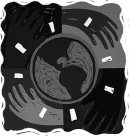
I dont want to be like these white Christians here. They sing about the love of Jesus. But they dont care about justice in South Africa.
A JEWISH UNIVERSITY STUDENT IN SOUTH AFRICA
I n 1979 I spent two wonderful weeks lecturing in South Africa. One of the most fascinating persons I met was a young university student named James. [] He came to the annual conference of an evangelical university movement where I was speaking about Jesus concern for the poor and his resurrection on the third day. Like most other parts of the South African Church then, this evangelical student movement had split into four groups: white Afrikaans-speaking, white English-speaking, colored, and black. The students at the conference were mostly white English-speaking.
James was not a Christian. He was Jewish and an ardent social activist. His passion in life was the struggle against apartheid. Somehow, however, these devout white Christians had caught his attention. James and I quickly became friends during the conference, talking about South African politics hour after hour.
Next pageFont size:
Interval:
Bookmark:
Similar books «Good News and Good Works: A Theology for the Whole Gospel»
Look at similar books to Good News and Good Works: A Theology for the Whole Gospel. We have selected literature similar in name and meaning in the hope of providing readers with more options to find new, interesting, not yet read works.
Discussion, reviews of the book Good News and Good Works: A Theology for the Whole Gospel and just readers' own opinions. Leave your comments, write what you think about the work, its meaning or the main characters. Specify what exactly you liked and what you didn't like, and why you think so.

